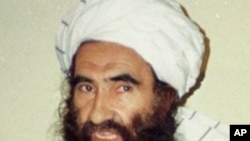The U.S. State Department has added another leader of the Pakistan-based Afghan insurgent group, the Haqqani Network, to its list of specially designated global terrorists. U.S. officials say Badruddin Haqqani, son of the founder of the group, is the operational commander of the network.
The U.S. action Wednesday came in coordination with a similar announcement from the United Nations, and it means that all U.N. member states will be required to impose an asset freeze, travel ban and arms embargo against Badruddin Haqqani.
A State Department announcement said Badruddin Haqqani is operational chief of the Haqqani Network, a group that has been at the forefront of insurgent activity in Afghanistan and is responsible for many high-profile attacks and kidnappings.
The network is a Taliban-affiliated group that conducts operations in Afghanistan from bases in Pakistan’s northwestern tribal districts. U.S. military Joint Chiefs of Staff Chairman Admiral Mike Mullen and others accuse the network of having links to Pakistan’s intelligence agency, the ISI.
But State Department Acting Deputy Spokesman Mark Toner on Wednesday sidestepped questions about ISI connections. He said the sanctions are aimed at curbing the Haqqani network’s ability to operate.
"These are concerns that have been talked about publicly before," said Toner. "Our effort is focused on trying to put pressure on the Haqqani Network, to limit their access to funding, financing, to limit their business dealings and to limit the areas where they can seek refuge, in order to put pressure on an organization that is a serious threat both to Afghanistan as well as coalition forces there."
State Department officials said the sanctions move was planned before the May 1 U.S. raid that killed Osama bin Laden in Pakistan, and subsequent concerns in the U.S. Congress and elsewhere that some Pakistani officials may have been aware of his presence there.
Last week, a senior Republican House member, Dana Rohrabacher, introduced legislation to halt U.S. aid to Pakistan, saying developments since May 1 have made it clear that Pakistan sheltered bin Laden.
State Department spokesman Toner said Congress is raising concerns that Pakistan has to address, but that the Obama administration opposes an aid cut.
"We hear their concerns," he said. "They are legitimate concerns given the circumstances of where bin Laden has found. But we believe, and we’ve also been making this point, that our counterterrorism cooperation and our assistance to Pakistan is in the long-term national security interests of the United States, as well as in the interest of building a stronger, more prosperous, and more democratic Pakistan,"
U.S. Senate Foreign Relations Committee Chairman John Kerry, one of the main authors of a 5-year, $7.5-billion civilian aid package to Pakistan, visits the country next week with the stated aim of putting strained relations "on the right track."
Officials here say Kerry is consulting with administration officials about the trip, but that he will not be carrying any specific message from President Barack Obama.
US Names Leader of Afghan Group Based in Pakistan As Terrorist













